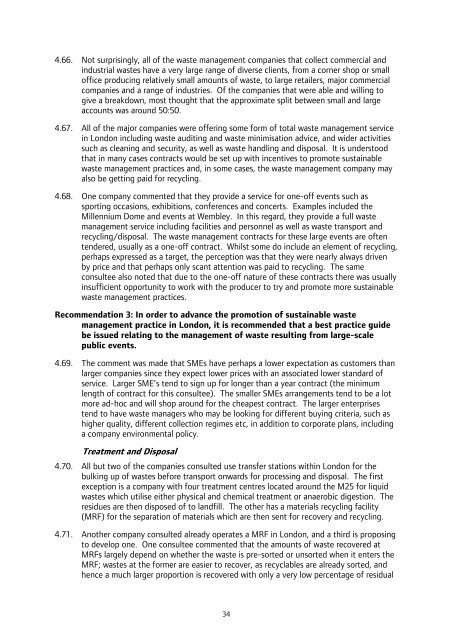London Wider Waste Strategy - London - Greater London Authority
London Wider Waste Strategy - London - Greater London Authority
London Wider Waste Strategy - London - Greater London Authority
You also want an ePaper? Increase the reach of your titles
YUMPU automatically turns print PDFs into web optimized ePapers that Google loves.
4.66. Not surprisingly, all of the waste management companies that collect commercial and<br />
industrial wastes have a very large range of diverse clients, from a corner shop or small<br />
office producing relatively small amounts of waste, to large retailers, major commercial<br />
companies and a range of industries. Of the companies that were able and willing to<br />
give a breakdown, most thought that the approximate split between small and large<br />
accounts was around 50:50.<br />
4.67. All of the major companies were offering some form of total waste management service<br />
in <strong>London</strong> including waste auditing and waste minimisation advice, and wider activities<br />
such as cleaning and security, as well as waste handling and disposal. It is understood<br />
that in many cases contracts would be set up with incentives to promote sustainable<br />
waste management practices and, in some cases, the waste management company may<br />
also be getting paid for recycling.<br />
4.68. One company commented that they provide a service for one-off events such as<br />
sporting occasions, exhibitions, conferences and concerts. Examples included the<br />
Millennium Dome and events at Wembley. In this regard, they provide a full waste<br />
management service including facilities and personnel as well as waste transport and<br />
recycling/disposal. The waste management contracts for these large events are often<br />
tendered, usually as a one-off contract. Whilst some do include an element of recycling,<br />
perhaps expressed as a target, the perception was that they were nearly always driven<br />
by price and that perhaps only scant attention was paid to recycling. The same<br />
consultee also noted that due to the one-off nature of these contracts there was usually<br />
insufficient opportunity to work with the producer to try and promote more sustainable<br />
waste management practices.<br />
Recommendation 3: In order to advance the promotion of sustainable waste<br />
management practice in <strong>London</strong>, it is recommended that a best practice guide<br />
be issued relating to the management of waste resulting from large-scale<br />
public events.<br />
4.69. The comment was made that SMEs have perhaps a lower expectation as customers than<br />
larger companies since they expect lower prices with an associated lower standard of<br />
service. Larger SME’s tend to sign up for longer than a year contract (the minimum<br />
length of contract for this consultee). The smaller SMEs arrangements tend to be a lot<br />
more ad-hoc and will shop around for the cheapest contract. The larger enterprises<br />
tend to have waste managers who may be looking for different buying criteria, such as<br />
higher quality, different collection regimes etc, in addition to corporate plans, including<br />
a company environmental policy.<br />
Treatment and Disposal<br />
4.70. All but two of the companies consulted use transfer stations within <strong>London</strong> for the<br />
bulking up of wastes before transport onwards for processing and disposal. The first<br />
exception is a company with four treatment centres located around the M25 for liquid<br />
wastes which utilise either physical and chemical treatment or anaerobic digestion. The<br />
residues are then disposed of to landfill. The other has a materials recycling facility<br />
(MRF) for the separation of materials which are then sent for recovery and recycling.<br />
4.71. Another company consulted already operates a MRF in <strong>London</strong>, and a third is proposing<br />
to develop one. One consultee commented that the amounts of waste recovered at<br />
MRFs largely depend on whether the waste is pre-sorted or unsorted when it enters the<br />
MRF; wastes at the former are easier to recover, as recyclables are already sorted, and<br />
hence a much larger proportion is recovered with only a very low percentage of residual<br />
34
















